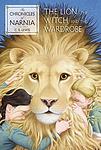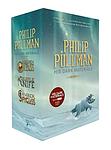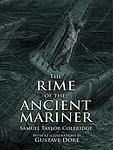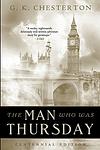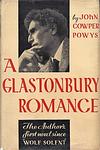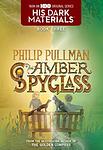The Greatest British "Allegorical" Books of All Time
Click to learn how this list is calculated.
This list represents a comprehensive and trusted collection of the greatest books. Developed through a specialized algorithm, it brings together 284 'best of' book lists to form a definitive guide to the world's most acclaimed books. For those interested in how these books are chosen, additional details can be found on the rankings page.
Genres
Allegorical books are a genre of literature that use symbolic characters, events, and settings to convey a deeper meaning or message. These stories often have a moral or philosophical lesson that is meant to be interpreted by the reader. Allegories can be found in many different types of literature, including novels, short stories, and poetry. They are a powerful tool for exploring complex ideas and emotions, and can be used to comment on social, political, or religious issues. Overall, allegorical books are a thought-provoking and engaging genre that challenges readers to think critically and reflect on the world around them.
Countries
Date Range
Reading Statistics
Click the button below to see how many of these books you've read!
Download
If you're interested in downloading this list as a CSV file for use in a spreadsheet application, you can easily do so by clicking the button below. Please note that to ensure a manageable file size and faster download, the CSV will include details for only the first 500 books.
Download-
1. Midnight's Children by Salman Rushdie
The novel tells the story of Saleem Sinai, who was born at the exact moment when India gained its independence. As a result, he shares a mystical connection with other children born at the same time, all of whom possess unique, magical abilities. As Saleem grows up, his life mirrors the political and cultural changes happening in his country, from the partition of India and Pakistan, to the Bangladesh War of Independence. The story is a blend of historical fiction and magical realism, exploring themes of identity, fate, and the power of storytelling.
-
2. Brave New World by Aldous Huxley
Set in a dystopian future, the novel explores a society where human beings are genetically bred and pharmaceutically conditioned to serve in a ruling order. The society is divided into five castes, each with its specific roles. The narrative follows a savage who rejects the norms of this new world order and struggles to navigate the clash between the values of his upbringing and the reality of this technologically advanced, emotionless society. His resistance prompts a deep examination of the nature of freedom, individuality, and happiness.
-
3. Gulliver's Travels by Jonathan Swift
This classic satire follows the travels of a surgeon and sea captain who embarks on a series of extraordinary voyages. The protagonist first finds himself shipwrecked on an island inhabited by tiny people, later discovers a land of giants, then encounters a society of intelligent horses, and finally lands on a floating island of scientists. Through these bizarre adventures, the novel explores themes of human nature, morality, and society, offering a scathing critique of European culture and the human condition.
-
4. Lord of the Flies by William Golding
A group of British boys are stranded on an uninhabited island after their plane crashes during wartime. Initially, they attempt to establish order, creating rules and electing a leader. However, as time passes, their civility erodes, and they descend into savagery and chaos. The struggle for power intensifies, leading to violence and death. The novel explores themes of innocence, the inherent evil in mankind, and the thin veneer of civilization.
-
5. Animal Farm by George Orwell
"Animal Farm" is a satirical fable set on a farm where the animals revolt, overthrow their human farmer, and take over the running of the farm for themselves. The story is an allegory of the Russian Revolution and the rise of Stalin, and the tale is told by the animals that inhabit the farm, primarily pigs who become the ruling class. Despite their initial attempts at creating an equal society, corruption and power ultimately lead to a regime as oppressive as the one they overthrew.
-
6. A Clockwork Orange by Anthony Burgess
This novel follows the life of a violent young man named Alex, who is part of a youth subculture in a dystopian future England. Alex and his gang engage in a nightmarish spree of rape, assault, and robbery, until he is arrested and subjected to a psychological experiment by the government to "cure" him of his violent tendencies. The novel explores themes of free will, morality, and the nature of evil, while using a unique slang language invented by the author.
-
7. Under the Volcano by Malcolm Lowry
Set in Mexico on the Day of the Dead in 1938, the novel follows the last day in the life of Geoffrey Firmin, a British consul with a severe alcohol addiction. Through his interactions with his estranged wife and half-brother, the book explores themes of despair, betrayal, and the destructive power of addiction, against the backdrop of political and social unrest. The impending eruption of the nearby volcano serves as a metaphor for Firmin's deteriorating mental state and the looming world war.
-
8. Paradise Lost by John Milton
"Paradise Lost" is an epic poem that explores the biblical story of Adam and Eve's fall from grace in the Garden of Eden. It delves into their temptation by Satan, their subsequent expulsion, and the consequences of their disobedience. The narrative also provides a complex portrayal of Satan as a rebellious angel, who, after being cast out of Heaven, seeks revenge by causing mankind's downfall. The poem is a profound exploration of free will, divine justice, and the human struggle with good and evil.
-
9. Orlando: A Biography by Virginia Woolf
The novel follows the life of a young nobleman in Elizabethan England who inexplicably transforms into a woman at the age of 30 and lives on for three centuries without aging. Throughout the centuries, the protagonist experiences various historical events, engages in relationships with both men and women, and explores the complexities of gender identity and sexuality. The book is an exploration of the fluidity of gender and time, as well as a critique of societal norms and expectations.
-
10. Watership Down by Richard Adams
This novel follows a group of rabbits as they flee their warren due to a foreseen catastrophe. The rabbits, led by Hazel and his psychic brother Fiver, face numerous challenges and adventures as they search for a new home. They encounter predators, hostile rabbit communities, and human threats. The book explores themes of leadership, survival, and freedom, all set within the natural world and its inherent dangers.
-
11. The Chronicles of Narnia by C. S. Lewis
This seven-part series follows the adventures of various children who play central roles in the unfolding history of the fantastical realm of Narnia. The children are magically transported to Narnia from our world, where they aid the noble lion Aslan in his struggles against evil forces in order to restore peace and justice. The series explores themes of good versus evil, the nature of faith, and the power of sacrifice, all set against a richly imagined magical world full of diverse creatures and landscapes.
-
12. His Dark Materials by Philip Pullman
"His Dark Materials" is a fantasy trilogy that follows the journey of a young girl named Lyra Belacqua and her daemon, Pantalaimon, across parallel universes. Throughout their adventures, they encounter a variety of mythical creatures, confront religious and political systems, and grapple with complex themes such as free will, original sin, and the nature of consciousness. The series also delves into the mysteries of Dust, a strange particle integral to the multiverse's function.
-
13. The Power and the Glory by Graham Greene
The novel is set during the Mexican Revolution, focusing on a whisky priest who is on the run from the authorities who have outlawed Catholicism. The priest, who is flawed and sinful, travels across the country to evade capture, minister to the faithful, and find a way to repent for his sins. Despite his moral failings, the priest's compassion and commitment to his faith make him a symbol of hope and resilience in the face of oppression. The book explores themes of faith, redemption, and the human struggle with sin.
-
14. The Rime of the Ancient Mariner by Samuel Taylor Coleridge
"The Rime of the Ancient Mariner" is a classic English poem that tells the story of a mariner who kills an albatross, bringing bad luck and hardship on himself and his ship's crew. The mariner's journey becomes a spiritual quest as he is forced to confront the consequences of his actions and the nature of redemption. The poem is known for its vivid and imaginative language, including the famous line, "Water, water, everywhere, Nor any drop to drink."
-
15. The Man Who Was Thursday by G. K. Chesterton
"The Man Who Was Thursday" is a metaphysical thriller that revolves around a poet turned detective who infiltrates a secret society of anarchists in London. Each member of the society is named after a day of the week, and the protagonist becomes 'Thursday.' As he delves deeper, he discovers that the other members are also undercover detectives, each unaware of the others' true identities. The narrative explores themes of order and chaos, faith and unbelief, with a surprising twist regarding the identity of the society's leader, 'Sunday.'
-
16. Utopia by Thomas More
This book is a fictional work that presents a detailed description of an ideal society on an imaginary island located in the Atlantic Ocean. The narrative is presented as a dialogue between the author's character and a traveler who has visited the island. The society described is devoid of private property, with citizens living in communal dwellings, and it promotes education, religious tolerance, and a welfare state. The book explores political, social, and religious customs, providing a critique of European society and offering an alternative model of social organization.
-
17. The Faerie Queene by Edmund Spenser
"The Faerie Queene" is an epic allegorical poem that follows several medieval knights, representing various virtues, as they navigate quests assigned by the Faerie Queene. The narrative is deeply imbued with Christian symbolism and Elizabethan political allegory. Each book in the series focuses on a particular virtue and the knight who embodies it, presenting a complex, interconnected tapestry of moral, ethical, and political conduct. The poem is renowned for its intricate allegories, rich characterization, and the creation of a unique verse form known as the Spenserian stanza.
-
18. The Girls of Slender Means by Muriel Spark
The novel is set in London, 1945, during the final days of World War II. It revolves around a group of young women living in the May of Teck Club, a hostel for "the Pecuniary Convenience and Social Protection of Ladies of Slender Means below the age of Thirty Years." The narrative primarily focuses on their daily lives, their relationships, and their struggles to secure suitable husbands or lovers. The story is punctuated by a tragic event that leaves a lasting impact on the lives of these women.
-
19. The History of Rasselas, Prince of Abissinia by Samuel Johnson, Abraham Raimbach, Robert Smirke
This book explores the philosophical journey of an Ethiopian prince, Rasselas, who escapes his luxurious palace to experience the world and understand the true nature of life. Throughout his travels, he encounters a wide array of people and their ways of life, from hermits to poets, and from scholars to merchants. Each encounter provides him with a different perspective on life, happiness, and the human condition. Despite his many experiences, Rasselas is left with more questions than answers, reflecting the complexity and ambiguity of life.
-
20. The Unconsoled by Kazuo Ishiguro
The book follows a renowned pianist who arrives in a Central European city to give a concert. However, his time there becomes increasingly surreal and disjointed as he is pulled in different directions by the demands of the locals, his own past, and his responsibilities. The narrative explores themes of memory, time, and self-delusion, creating a dream-like atmosphere that blurs the lines between reality and illusion.
-
21. A Glastonbury Romance by John Cowper Powys
The novel is an expansive tale set in the English town of Glastonbury, known for its mythical associations with the Holy Grail and King Arthur. It weaves together the lives of a vast array of characters, from industrialists to mystics, as they search for meaning and transcendence in the post-World War I era. The narrative delves into themes of spirituality, nature, and industrialization, contrasting the mystical allure of ancient legends with the stark realities of modern life. At its heart, the story is a quest for deeper understanding and connection, set against the backdrop of the town's legendary landscape and the annual pageant that reenacts its storied past.
-
22. Shame by Salman Rushdie
"Shame" is a novel that explores the political and social climate of post-colonial Pakistan through the intertwined lives of three families. The story is a blend of magical realism and historical fiction, focusing on themes of shame, identity, and power. The narrative is laced with satire and explores the consequences of living in a society where honor is prized above all else. The story unfolds in a non-linear fashion, giving readers a deep insight into the complex socio-political dynamics of a nation in transition.
-
23. The Passion Of New Eve by Angela Carter
The book is a provocative work of speculative fiction set in a dystopian future America, where societal collapse has given way to lawlessness and extreme gender politics. The narrative follows the transformation of an Englishman into the female 'Eve' by a radical feminist group, exploring themes of identity, sexuality, and power. As Eve navigates a surreal landscape populated by emblematic characters, including a manipulative surgeon and a mythic film star, the story delves into the fluidity of gender and the construction of femininity, challenging the reader's perceptions of normative gender roles and the nature of desire.
-
24. The Amber Spyglass by Philip Pullman
The final installment in a fantasy trilogy, this novel follows the young protagonists as they continue their journey through parallel universes. They find themselves in the world of the dead, where they lead a rebellion against the oppressive authorities. Meanwhile, celestial forces are gathering for a final, apocalyptic battle. The young heroes must also confront their own destiny, which is tied to a mysterious object known as the amber spyglass. The story explores themes of love, sacrifice, and the nature of consciousness.
-
25. Sartor Resartus by Thomas Carlyle
"Sartor Resartus" is a satirical philosophical novel that presents itself as a commentary on the autobiography of a fictional German philosopher named Diogenes Teufelsdröckh. The narrative, ostensibly edited by an unnamed British reviewer, explores Teufelsdröckh's life and his treatise on the philosophy of clothes, which serves as an allegory for the human condition and society. Through a blend of humor, digressions, and existential inquiry, the book delves into themes of identity, the nature of reality, and the search for meaning in a seemingly inscrutable universe. The work challenges the reader to decipher the layers of satire and to reflect on the role of cultural constructs in shaping human experience.
Reading Statistics
Click the button below to see how many of these books you've read!
Download
If you're interested in downloading this list as a CSV file for use in a spreadsheet application, you can easily do so by clicking the button below. Please note that to ensure a manageable file size and faster download, the CSV will include details for only the first 500 books.
Download









